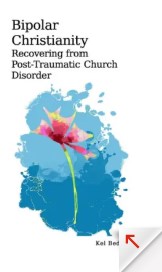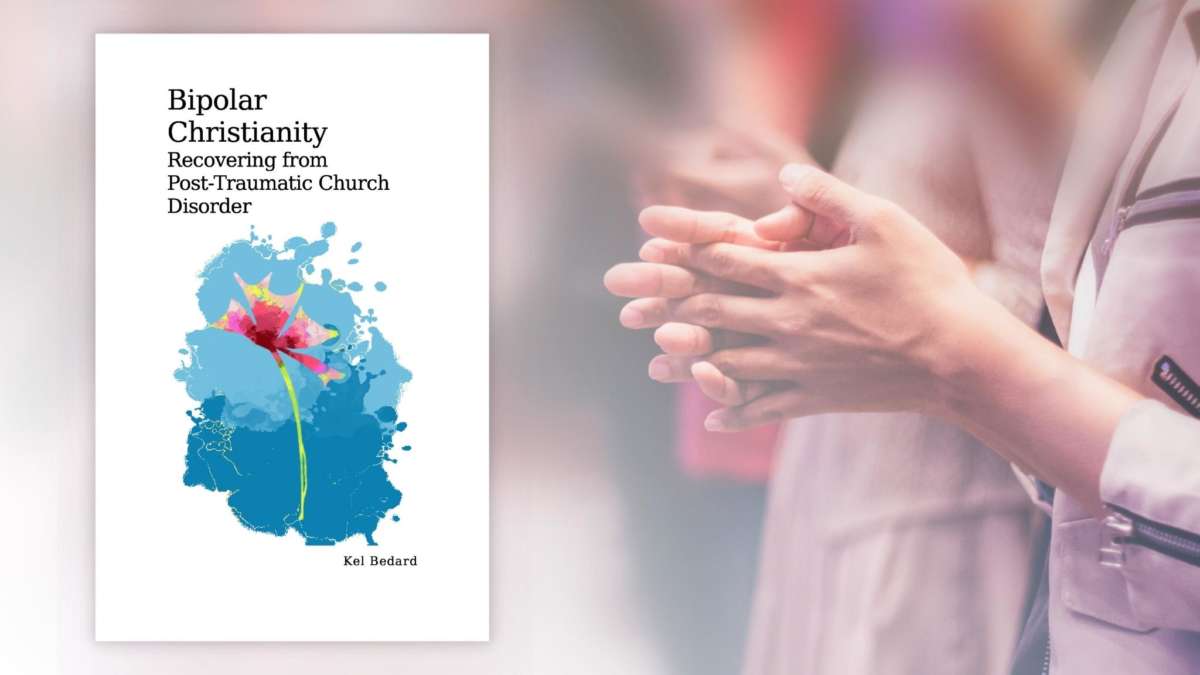Bipolar Christianity: Recovering from Post-Traumatic Church Disorder by Kelly Bedard
For some people, religion can be a deeply fulfilling aspect of life. Finding meaning and comfort in a higher power, expressing joy and gratitude at the blessings of faith, belonging to a supportive community of worshippers — these are just a few of the benefits.
But religion can also harbor a dark side: manipulation, indoctrination, judgment, shame. And much of this can be attributed to an inflexible adherence to dogma, being more attendant to the “letter of the law” than the spirit of it.
In Marlene Winell’s classic work on religious trauma syndrome, Leaving the Fold, she writes, “The very nature of dogma is to separate, because these kinds of systems claim to have the only truth. Therefore, no matter how altruistic its announcements, a rigid religion will produce judgment [which] leads to discrimination and, all too often, to persecution.”
Yet while Winell’s book focuses on the recovering fundamentalist parishioner, such dangers of dogma aren’t reserved solely for fundamentalists — or for parishioners, for that matter. Kelly Bedard knows this all too well, as chronicled in his book Bipolar Christianity: Recovering from Post-Traumatic Church Disorder (B&N Press).
NO GOOD DEED GOES UNPUNISHED
As a Lutheran pastor, Bedard has borne witness to churches torn apart by dogma, whether among groups of parishioners or by the actions of church governing bodies. He has lead parishes that ultimately lost large numbers of attendees due to bitter infighting. He has run afoul of church elders. There seems to be no end to the drama created in trying to accommodate the needs of parishioners. Especially from those who are loath to deviate from tradition (aka dogma). No good deed goes unpunished, as they say.
The patterns repeated again and again as he moved from congregation to congregation. Eventually, Bedard’s relationship with the Lutheran Church hit a crisis point. A particularly thorny situation at one of his parishes left both him and the congregation de-rostered from the synod. He stood trial at a church governance hearing in an attempt to regain his rostered status but ultimately failed — despite the majority support of his congregation.
But the story doesn’t end there. “Divorced” from the denomination, he wandered afield for a while before being called back to serve at another Lutheran parish. This time he accepted a position as a lay minister, only to be “sniffed out” by the powers that be and kicked to the curb yet again.
Bedard finally had had enough. In the wake of this last debacle, his parish had lost over half of its membership, and the refugees began meeting with Bedard weekly at the local Eagles lodge, calling their group “Churchics Anonymous.” It was here that he began working on a 12-step recovery program for those whose spirituality has been wounded by what Bedard refers to as “judgmental and legalistic Christians and churches.”
Modeling his method on that of Alcoholics Anonymous, there is much self-reflection inherent in recovery from what he terms “post-traumatic church disorder.” Self-esteem needs to be restored. Forgiveness needs to be practiced. Harmful thought patterns must be released. A new relationship with God must be forged.
Whether you are suffering from religious trauma syndrome or have simply found yourself turned off by church drama, Bedard’s method will give you a second chance at a fulfilling spiritual life — this time, on your own terms.
About Kelly Bedard:
Reverend Kel(ly) Bedard, a native of Oregon, earned his Bachelor of Arts degree in Theology from Concordia University in Portland, Oregon in 1982 and his Master of Divinity degree from Concordia Seminary in St. Louis, Missouri in 1988. From 2004-2009 and subsequently he has specialized in community outreach per the Doctor of Ministry curricula of Concordia Seminary in St. Louis, Missouri — including a practicum living in a homeless shelter and accompanying seminary students in outreach ministries in the city and suburbs of Houston, Texas; co-founding an early childhood center; 41 baptisms on one day as a result of outreach in another ECC; serving as a life advocate for bar patrons; and co-founding a disaster response/community organizing non-profit in wake of Hurricane Katrina. He has pastored congregations in Minnesota, Virginia, Oregon, Michigan, Louisiana and Illinois and is currently serving as a crisis counselor with WestCare’s Guidance/Care Center’s Mobile Response Team from Key West to Marathon, Florida.
Buy this Book!
Barnes & Noble



